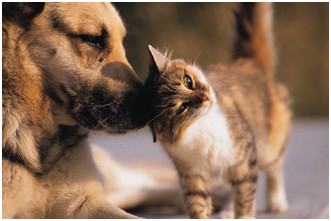

By Fire Chief Sam DiGiovanna
July 1, 2013 (San Diego) – If your pets could talk, chances are they “wouldn’t” give you a “lick in,” says Fire Chief Sam DiGiovanna. Dogs can develop heat stroke and sunburn in the hot weather, but one danger to dogs that's frequently overlooked is the potential for paw pad injuries and burns from walking a dog on hot pavement or sand. Walk the dog in the early morning or evening to avoid paw pad burns. Avoid walking the dog in the heat of the day, when the sun beats down, heating the pavement and sand. Walk the dog on the grass; it’s cooler for you and them. Are you taking your dog hiking? Would you like to hike barefoot in the heat on rocky terrain? Maybe your dog wouldn’t either! Make sure you have water for your dog while hiking and do so during a cool hour and “watch those paws!”
Be a Cool Cat! A cat outdoors can quickly become dehydrated and suffer heat stroke as well. Make sure there is access to fresh, cool water at all times. Place water bowls in shady areas to reduce rapid evaporation and to keep the water temperature more comfortable. Don’t tether your cat on a deck or other area because she won’t be able to move to a shady spot as the sunlight shifts. Your cat needs to be able to reach shady areas. Just like dogs, a cat’s sensitive paw pads are very vulnerable to being burned when walking across hot pavement. Don’t leave your cat in the car. In just a few short moments, the temperature inside a locked car can skyrocket.
Also make sure to keep pets indoors on July 4th after dark, since fireworks can frighten animals into running off.
No matter what kind of pet you own, consideration to the weather and elements is important to keeping your pet healthy and happy!
For additional pet safety information contact your local veterinarian and visit http://vetmedicine.about.com/cs/summerinfo/a/summersafety.-6lv.htm
*Note: The information in this article was compiled from various sources. These suggestions are not a complete list of every preventative or loss control measure. The information is not intended to replace additional safety manuals or the advice of another qualified professional(s). We make no guarantee of results from use of this information. We assume no liability in connection with the information or the suggestions made.







Recent comments